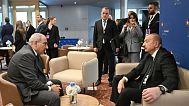Montenegro’s Path to the EU: Progress, Challenges, and What Lies Ahead
Montenegro has taken significant steps on its path to join the European Union. As one of the most dedicated candidates among the Western Balkans, its progress has turned global attention towards this small nation. In this article, we explore Montenegro’s recent advances, ongoing challenges, and its standing amidst regional EU enlargement talks.

Montenegro: Leading the Way in the Western Balkans
Montenegro’s ambition to join the EU has been matched by decisive political action and broad institutional reforms. European Council President António Costa recently praised Montenegro, calling it “one of the finest examples of the EU’s positive enlargement momentum.” This endorsement came during Costa’s tour through the Western Balkans, in which Montenegro stood out for its clear progress and commitment (read more).
Montenegro’s journey has not been without hurdles. However, strong political consensus, especially in the pursuit of legal and democratic reforms, has been crucial. Building consensus among political forces remains vital for completing the accession process and ensuring lasting institutional stability.
Regional Momentum and the Role of Montenegro
The Western Balkans region has re-emerged as a strategic priority for the EU. António Costa, along with EU Commission President Ursula von der Leyen, has urged all countries to “seize the enlargement momentum.” Among the six Western Balkans aspirants, Montenegro—together with Albania—has been identified as a potential frontrunner for EU accession. This is due to their ongoing reforms and dedication to the enlargement agenda (more details here).
A primary message delivered to Western Balkans leaders called for continued reforms, especially in the rule of law and anti-corruption efforts. Albania was noted for its rapid progress, and Montenegro’s stable political environment makes it a likely candidate to become the 28th EU member state, potentially before 2028.
Forward Steps: Challenges and Aspirations
Montenegro’s accession journey underlines the importance of political will, institutional reform, and broad consensus. As regional leaders recently gathered in Tirana, the consensus was clear: the time is ripe to intensify efforts and deliver on critical milestones (see the full recap).
The process is not without challenges. Deepening rule of law, expanding the fight against corruption, and maintaining national unity are key. For Montenegro, success will hinge on sustaining reform momentum and meeting the EU’s rigorous standards.
Conclusion
Montenegro stands at a turning point. Its achievements thus far have positioned it as a model for EU hopefuls in the Balkans. With continued dedication and consensus, Montenegro may soon bridge the gap between aspiration and EU membership. Now is the time for leaders and citizens to unite, finalize key reforms, and move confidently toward Europe’s shared future.